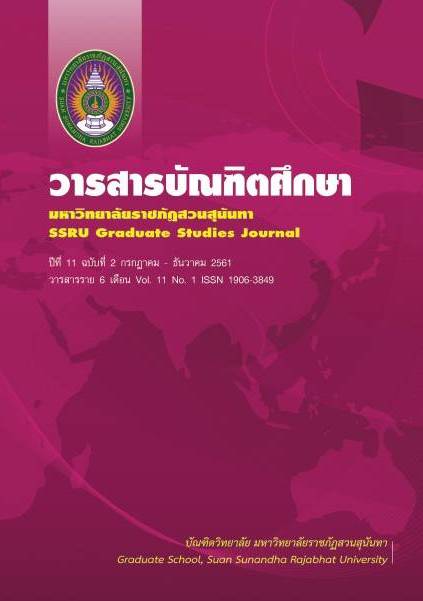THE DESIRABLE COMPETENCIES OF THE TRAINERS IN BANGKOK VOCATIONAL TRAINING CENTERS
Main Article Content
Abstract
This research aimed to: 1) study opinion of trainers on desirable competencies; and 2) compare the opinion on desirable competencies among trainers with different gender, age, educational level, working experiences as a trainer, and field of vocational training on four aspects of competencies including knowledge, skills, attributes, and professional ethics. A questionnaire was used to collect data from the research sample consisting of 260 trainers of Bangkok Vocational Training Centers who were selected by using simple random sampling. Hypothesis was tested with-test and the one-way analysis of variance (ANOVA).
The result found that: 1) the trainers with different gender, age, educational level, and field of vocational training had no difference in their the opinion on the overall desirable competencies as well as each of the aspect of the competencies; and 2) The trainers with different working experiences had different opinion on the overall desirable competencies and those in the aspects of knowledge, and professional ethics, with a .05 level of statistical significance.
Article Details
References
ณรงค์วิทย์ แสนทอง. (2547). การบริหารงานทรัพยากรมนุษย์สมัยใหม่ภาคปฏิบัติ. กรุงเทพฯ: เอช อาร์ เซ็นเตอร์.
เดชา เดชะวัฒนไพศาล. (2543). Competency-based Human Resource Management. วารสารการบริหารคน, 4(21), 11-18.
ประกฤต จันทน์เกษร. (2548). บทบาทหน้าที่ของวิทยากรเกษตรกรในการถ่ายทอดเทคโนโลยีการเกษตรของตำบลน้ำร่องและตำบลหลักในเขตภาคเหนือ. วิทยานิพนธ์วิทยาศาสตรมหาบัณฑิต มหาวิทยาลัยเกษตรศาสตร์.
วิวัลย์ดา สิริชีวานันท์. (2545). การพัฒนาตัวบ่งชี้สมรรถนะหลักของวิทยากร กระบวนการในงานสาธารณสุข การวิเคราะห์ความตรงเชิงประจักษ์และความไว. ปรัชญาดุษฎีบัณฑิต วิจัย วัดผลและสถิติการศึกษา, มหาวิทยาลัยบูรพา.
ศรัญญา ทับน้อย. (2559). การพัฒนาความสามารถด้านการเป็นวิทยากรของศูนย์การศึกษาพิเศษประจำจังหวัดกำแพงเพชรโดยใช้การวิจัยปฏิบัติการแบบมีส่วนร่วม. วารสารมนุษยศาสตร์และสังคมศาสตร์, 10(1), 209.
สำนักงานคณะกรรมการข้าราชการพลเรือน. (2559). การพัฒนาระบบสมรรถนะ. สืบค้นเมื่อ มกราคม 28, 2559, จาก http://www.ocsc.go.th/ocsc/th/index.php?option=com _content&view=article&id=258&Itemid=252.
สำนักงานคณะกรรมการพัฒนาการเศรษฐกิจและสังคมแห่งชาติ. (2554). แผนพัฒนาเศรษฐกิจและสังคมแห่งชาติ ฉบับที่สิบเอ็ด พ.ศ. 2555-2559. สืบค้นเมื่อ ธันวาคม 5, 2558, จาก http://www.nesdb.go.th/Portals/0/news/plan/p11/plan11.pdf.
สำนักยุทธศาสตร์และประเมินผล, กรุงเทพมหานคร. (2552). แผนพัฒนากรุงเทพมหานคร ระยะ 12 ปี (พ.ศ. 2552-2563) กรุงเทพมหานครแห่งความน่าอยู่อย่างยั่งยืน. กรุงเทพฯ: ดาวฤกษ์ คอมมูนิเคชั่นส์.
สุรเดช ชูพินิรอบคอบ. (2545). การศึกษาคุณลักษณะที่พึงประสงค์ของวิทยากรภายนอกตามทัศนะของคณะกรรมการและเจ้าหน้าที่จัดฝึกอบรม. สารนิพนธ์ศิลปศาสตรมหาบัณฑิต มหาวิทยาลัยรามคำแหง.
อุกฤษณ์ กาญจนเกตุ. (2543). การใช้ Competency ในการบริหารงานบุคคล. วารสารบริหารคน, 4(21), 11-18.
Bloom, B. S. (Ed.). (1956). Taxonomy of educational objectives: The classification of educational goals: Handbook II affective domain. New York: David Mckey.
Boyatzis, R. E. (1982). Competence at work. In a Stewart (Ed.), Motivation and society. San Francisso: Jossey-Bass.
McClelland, D. C. (1975). A competency model for human resource management specialists to be used in the delivery of the human resource management cycle. Boston: Mcber.
Spencer, L. M., & Spencer, S. M. (1993). Competence at work: Model for superior performance. New York: Wiley.
Yamane, T. (1973). Statistics: An introductory analysis (3 rd ed.). New York: Harper & Row.


